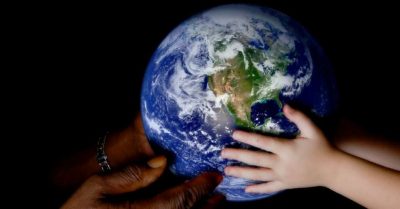Video: “We Must Make Peace with our Planet”. Vandana Shiva
Dr Vandana Shiva’s Message on World Environment Day 2018

Note to readers: please click the share buttons above
“We must make peace with our planet.”
Navdanya means ‘Nine seeds’ or ‘New Gift’, which is a means of educating farmers of the immense advantages in the practice of having various and individualized crops rather than receiving offers from mono-culture food producers. The initiative brought about the establishment of over 40 seed banks across India for diversified agriculture. Shiva also set up ‘Bija Vidyapeeth’ which is an international College for sustainable living, in Doon Valley, in 2004.
Her first book entitled ‘Staying Alive’ was published in 1988 and it helped redefine perceptions of Third World Women. Also, Shiva has written copious reports for FAO and the UN on mainly women rights issues and sustainable agriculture and even manufacturing.
Besides, she has worked for the Promotion of biodiversity in agriculture to increase productivity, nutrition and farmer’s incomes.
.
It is for this work that Time magazine recognized her as an ‘Environmental Hero in 2003. In an interview with David Borsamian, Shiva argues that the Seed-Chemical Package promoted by Green revolution agriculture had depleted soil, destroyed living ecosystems, and negatively impacted people’s health. In her work, she cites data allegedly demonstrating that today there are over 1400 pesticides that may enter the food system across the world because only 1% of pesticides sprayed act on the target pest.
Vandana Shiva, alongside her sister, Dr Mira Shiva, argues that the health costs of increasing pesticide and fertilizer use range from cancer to kidney failure to heart disease. Also, on what she calls ‘biopiracy’, Shiva has fought against and won attempted patents of several indigenous plants in India, such as basmati by the US Department of Agriculture and the Corporation WR Grace. Moreover, her activitism included the struggles against the promotion of the Sale and consumption of ‘Golden rice’ (a breed of rice that has been genetically engineered to biosynthesize beta-carotene, a precursor of Vitamin A) in India by GMO corporation of India, around 2013. However, there have been several and severe criticisms of Vandana Shiva’s views and methods by some reputed solid analysists notably investigative Journalist Michael Specter of the New Yorker in an article on 25 August, 2014 entitled ‘Seeds of Doubt’ and journalist Kerth Kloor in an article published in ‘Discover’ on 23 October, 2014 entitled ‘The Rich allure of a Peasant Champion. Notwithstanding, all the criticisms have not reduced the personality and achievements of Vandana Shiva as a first-rate, world-class environmentalist.
Prof. Vandana Shiva is a physicist, ecofeminist, philosopher, activist, and author of more than 20 books and 500 papers. She is the founder of the Research Foundation for Science, Technology and Ecology, and has campaigned for biodiversity, conservation and farmers’ rights, winning the Right Livelihood Award [Alternative Nobel Prize] in 1993. She is executive director of the Navdanya Trust.

